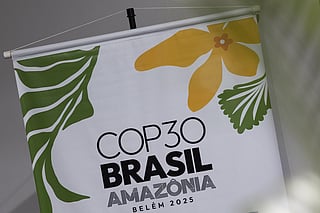
The 30th Conference of Parties (COP30) to the United Nations Framework Convention on Climate Change opened in Belém, Brazil, on 10 November 2025 and will run until 21 November. Here’s a roundup of everything that unfolded during the first week of the global climate summit.
A compromise on the agenda was reached on the opening day, avoiding the usual “agenda fight”. Four contentious items — including the financial obligations of developed countries to developing nations under Article 9.1 — were left out of the adopted agenda.
On the opening day of the 30th Conference of Parties to the United Nations Framework Convention on Climate Change (COP30) at Belem, Brazil, the ‘Fund for Responding to Loss and Damage’ took a historical step forward by launching its first call for funding requests under the Barbados Implementation Modalities.
On Day 1, the ‘Fund for Responding to Loss and Damage’ launched its first call for funding requests under the Barbados Implementation Modalities — a significant step for regions in India facing severe climate impacts.
Negotiations on the Global Goal on Adaptation (GGA) began with countries seeking to overcome political divides and work towards adopting a framework of indicators. Finance, support and flexibility in measuring adaptation progress were key priorities.
Day 2 saw a call from LMDCs for a three-year work programme on Article 9.1. The G77 and China proposed a new Just Transition Mechanism based on fairness and cooperation; India emphasised equity and a people-centred approach. Developing country groups continued to press for finance, equity and strong adaptation outcomes.
Includes: informal GGA consultations; the Belém Declaration on Hunger, Poverty and People-Centred Climate Action.
Over two days, negotiators spent eight hours in closed-door talks on four unresolved issues: developed countries’ financial obligations, the synthesis report on climate goals and the 1.5°C implementation gap, unilateral trade measures, and the transparency of national climate data.
Day 3’s informal stocktaking plenary offered little clarity on issues including Article 9.1 and unilateral trade measures.
A new informal note on the GGA captured divergent views, while talks on Article 2.1(c) showed no consensus.
Also released:
IHLEG report outlining a $1.3 trillion per year climate finance roadmap, including $50 billion for just and equitable transitions
Launch of the ‘Global Initiative for Jobs & Skills for the New Economy’
Declaration on Information Integrity on Climate Change
The Presidency unveiled the Belém Health Action Plan, the first international climate-adaptation framework dedicated to health.
More than 35 leading philanthropies, working through the Climate and Health Funders Coalition, committed an initial $300 million to address both the climate crisis and its health impacts.
Day 4 saw Parties seeking clearer direction from the Presidency. Discussions continued on the Just Transition Work Programme, the UAE dialogue on implementing the Global Stocktake, and Article 2.1(c), where progress was made on potential safeguards.
The Belém Health Action Plan was launched, alongside new projections that the number of people exposed to extreme heat could increase seven-fold by 2050.
The UAE’s Just Transition Work Programme remains a major agenda item due to its cross-cutting nature and links to unilateral trade measures, additional finance and other means of implementation. Momentum on just transition has increased since COP29, reflected in discussions at the 62nd Subsidiary Body session in Bonn earlier this year.